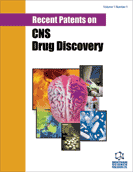Abstract
Huntington's disease (HD) is an autosomal dominant inherited and progressive neurodegenerative disorder with motor dysfunction and cognitive deficits. Although, there are no treatments to delay the appearance and the progression of HD, there are potential drugs currently in preclinical and clinical trials that are focused on HD therapy. The signaling pathways involved in HD are not yet clearly elucidated; however, expression of mutant huntingtin protein is considered a key factor in the induction and/or progression of HD. The demonstration that the onset and progression of HD in models of transgenic mice, in particular, are delayed or improved by the application of neurotrophic factors has emphasized their importance in neuroprotection in HD. In addition, other compounds targeting the HD gene or mutant huntingtin protein are currently in preclinical and clinical testing and may show promising neuroprotective effects. There are current patented drugs that are currently being considered as potential therapeutics for HD. These patented drugs may provide promising therapy for HD.
Keywords: Huntington's disease, neurodegenerative diseases, neuroprotection, oxidative stress, neurotrophic factors, mutant huntingtin proteins, Glutamatergic System, neurodegenerative disorders, Anterograde transport, Brain-derived neurotrophic factor
 6
6





















